The Big Read: To stop maid abuse, stop the power imbalance
SINGAPORE — Whenever her employer gets angry with Ruby (not her real name) for supposedly not following her instructions, she would threaten to hit the domestic worker.
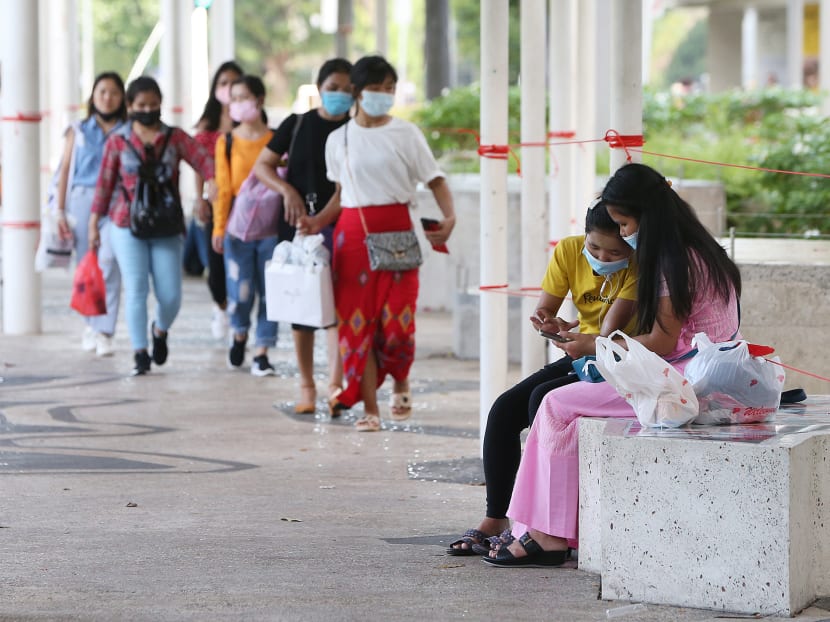
While the recent spate of abuse cases have raised eyebrows all around, the issue has long dogged the nation since domestic helpers become a familiar sight in many a Singaporean household.
- Foreign domestic workers who are isolated from contact beyond their employment environments are the ones who are most vulnerable to abuse, according to most of the NGOs and employment agencies TODAY spoke to
- NGOs welcome MOM’s home visit initiative, but say that checks should be done for all foreign domestic workers throughout the course of their employment
- These helpers are vulnerable to abuse because they are powerless; employers can terminate their contract and send them home at will
- Psychologists say displacement of anger is one reason why employers abuse their helpers
SINGAPORE — Whenever her employer gets angry with Ruby (not her real name) for supposedly not following her instructions, she would threaten to hit the domestic worker.
“She will say ‘I will slap you since you can’t understand, so you can wake up’,” said the 41-year-old Philippine national.
“I’m thinking (to myself) ‘Try to slap, I’ll report to MOM.”
For four years now, Ruby has been the sole helper caring for a family of six in a three-storey landed property. She cleans air-conditioning pipes monthly, does gardening and hand washes the family’s clothes, sofa covers and bedsheets because she is not allowed to use the washing machine.
She often spends her nights on the kitchen floor because her designated room is a storage room with little space and ventilation.
Ruby is not allowed to use any space in the fridge, living on rice, noodles, eggs and tuna, which are food items that her employer permits.
Despite knowing that she can lodge a report against her employer to the Ministry of Manpower (MOM), Ruby has never made one.
“I’m scared that (if I do so), the decision will be to send me home. Also sometimes, (my employer) becomes nice — she will talk to me and laugh. But I don’t understand her kindness. Today she can be very nice, tomorrow she will be very angry so I don’t know what to do,” said Ruby.
Ruby, who is a single mother of three school-going children, aged 22, 19 and 14, is only given access to her phone on weekends. She had initially agreed to this arrangement thinking that her employer would eventually “ease the rules”, but that has not been the case.
“I need my phone to know what is going on with my children. Once, one of them got dengue on Tuesday and I only found out about it on Saturday. They ended up having to take a loan with high interest because they couldn’t reach me,” she said.
Despite these challenges, she continued working for the same employer when her first employment contract ended because her house in the Philippines burnt down in 2018, and Ruby took an advanced payment of S$3,500.
However, once she had finished paying that amount back, she requested for a transfer.
“I am scared. She doesn’t want me to transfer …she said she will just send me back,” said Ruby, who is still in limbo. While her latest contract ends in July, her employer is still threatening to send her back to the Philippines if she wants to transfer to another household.
“I cannot go back. I have my children who go to school, I have things to pay….If I go back I have no work,” said Ruby, adding that a typhoon which swept through the Philippines last year had affected her newly built home.
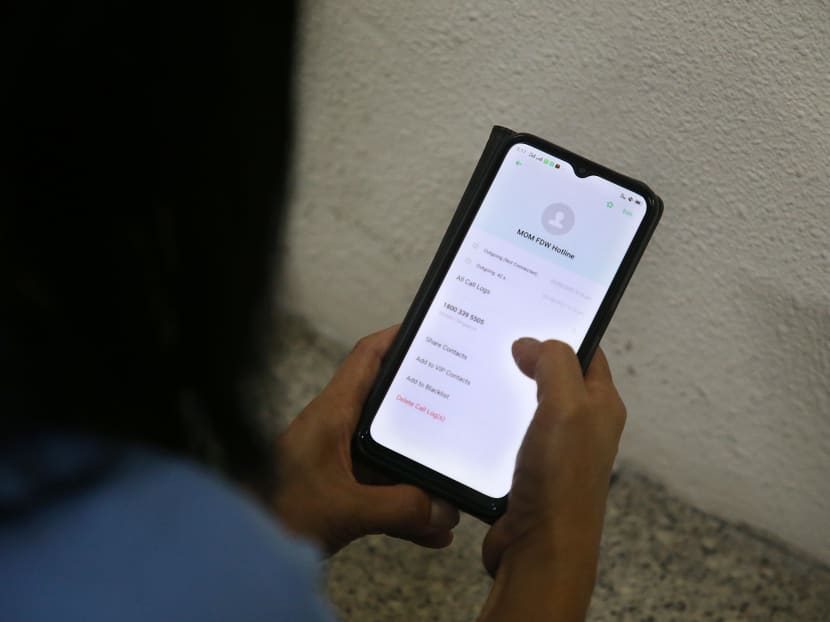
For Ummairoh, a domestic helper from Indonesia, one of her first employers in Singapore back in 1999 were a couple with a baby.
She had to clean two homes, getting only three hours of sleep daily in the living room.
“From 4 to 8am I would be cleaning the house with my eyes closing because I was too sleepy, too tired. They will watch me cleaning and whenever I'm falling asleep, they will just bang my head to wake me up. By 8am, I will go to the grandmother's house,” said Ms Ummairoh, now 43.
“Once I was so hungry I took a few spoons of the baby’s milk powder. They found out and made me clean the toilet. I had to stand on a ladder and clean all the tiles on the top,” she recalled.
Ms Ummairoh then started having very bad rashes on her hands from an allergic reaction until she could not even raise her hands due to the pain and itchiness.
“They didn't even bring me to the doctor. They just sent me back to the agency. When I went back to agency, the punishment was to stand in the corner on one leg. It was so traumatic. But I’m glad they sent me back or else I don’t know what would have happened to me,” she said.
Just like Ruby, Ms Ummairoh had kept her misery to herself. Their reticence — and that of several other domestic helpers interviewed by TODAY — is prompted by various factors, such as the feeling that they have no one to turn to, fear of being sent back home and the lack of evidence of their employers’ wrongdoings.

Such silence in the face of employers from hell can lead to tragedy — as seen in the spate of abuse cases involving domestic helpers in Singapore that have hogged the headlines recently. One particularly disturbing case involves a 24-year-old helper from Myanmar, Ms Piang Ngaih Don, who died after being beaten, burned, and starved until her weight was reduced to 24kg by her employer, Gaiyathiri Murugayan. The prosecution is seeking life imprisonment but Gaiyathiri’s lawyers have asked for the culpable homicide charge to be reduced.
Only this week, a heavily pregnant woman was also jailed for eight weeks for abusing her domestic helper by hitting and slapping her, as well as forcing her to eat dirty cotton wool and hair off the toilet floor.
The abuse cases show that much more needs to be done to protect the hundreds of thousands of domestic helpers here. The average population of domestic helpers who worked in Singapore from 2017 to 2020 was about 250,000 per year, said Mr Shamsul Kamar, the executive director of the Centre for Domestic Employees (CDE), citing MOM official statistics. The centre was set up by the National Trades Union Congress to help distressed workers.
According to MOM figures, there was an average of 270 reported physical abuse cases against domestic helpers over the same period.
In a bid to step up its monitoring of the well-being of foreign domestic workers, the MOM announced last month that it has begun conducting random house visits to check on their working and living environments. The ministry intends to carry out 200 random house visits per month.
Employers will be notified about one week in advance of such visits, and if they refuse, the MOM will require the employers to accompany their foreign domestic workers to the ministry’s office for an interview instead.
The ministry will also be resuming in-person interviews of first-time foreign domestic workers this month, and these sessions will be expanded to include all first-time foreign domestic workers by the end of the year. Currently, first-time workers are randomly selected for such interviews.
The CDE has been conducting the interviews on MOM’s behalf since 2017 to find out how these workers are adjusting to working in Singapore.
Due to the Covid-19 pandemic, the CDE began conducting the interviews via video last year. The interviews typically take place within three to six months after a first-time foreign domestic worker has started employment.
A LONGSTANDING PROBLEM
While the recent spate of abuse cases have raised eyebrows all around — with Law and Home Affairs Minister K Shanmugam saying “the beastiality of the conduct was shocking” in reference to Ms Piang’s case — the issue has long dogged the nation since domestic helpers become a familiar sight in many a Singaporean household.
Philippine Embassy minister and consul general Adrian Bernie Candolada told TODAY that between January and April 30, the embassy received notifications from the police of 23 cases of Filipino domestic workers complaining of abuse — verbal or physical — by their employers.
He added that the embassy has not received any complaints directly from domestic helpers.
In the whole of last year, it received fewer than 20 cases of complaints filed by Filipino domestic workers.
“We surmise that due to restrictions in the movement of people and the circuit breaker, some cases were not reported to the police,” he said, referring to the curbs imposed to halt the spread of Covid-19.
Over at the Indonesian Embassy, from January to April, they had 182 domestic workers sheltered at the embassy due to various reasons, from disharmony cases with employers, as well as labour and police cases.
Of that number, around 10 per cent of the cases were alleged domestic workers abuse, said a spokesperson, adding that the number varies from time to time.
TODAY also reached out to the Embassy of The Republic of The Union of Myanmar, the High Commission of India in Singapore and the High Commission of Sri Lanka in Singapore but did not receive replies.
To tackle the longstanding problem, Singapore society needs to “scrutinise our attitudes towards domestic work, and domestic workers”, said Ms Jaya Anil Kumar, a case manager at Humanitarian Organisation for Migration Economics (Home), a non-governmental organisation (NGO) dedicated to supporting and empowering migrant workers who suffer abuse and exploitation.
She added: “The devaluation that societies have towards domestic work perpetuates abusive behaviour towards those that carry out such work.”
Ms Jaya welcomed MOM’s latest initiatives and stressed that it is not foreign domestic workers in Singapore for the first time who could suffer abuse.
Checks should be done on all domestic workers, and throughout the course of their employment, she reiterated. “Employment agencies can play a part in this — with resources, guidelines and protocols provided by the authorities. Ultimately, better prevention, detection, and support for domestic workers who seek help, is key,” she said.
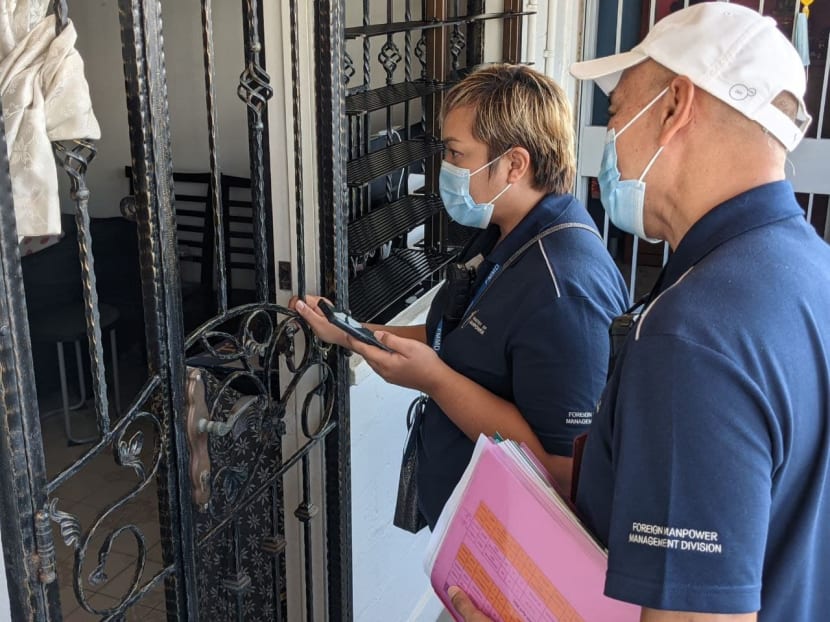
Ms K Jayaprema, president of the Association of Employment Agencies (Singapore), or AEAS, said that she has been asking MOM to mandate that employment agencies can visit the homes of the domestic helpers whom they place.
“It is about access and communication. If not, there's no other way of drawing it out of the girl. She needs to be able to trust this person who brought her in. It’s about familiarity,” she said.
“(The existing) one-day Settling-In Programme course is not going to solve it. MOM visiting 200 homes a month is not going to solve it. There are 250,000 domestic workers. I have a whole employment agency workforce out here to help.”
Mr John Gee, former president of Transient Workers Count Too (TWC2), an NGO which promotes equitable treatment for migrant workers in Singapore, said that with these home visits, the presumption would be that an abused worker would seize the chance to speak up, and the knowledge that this could happen might discourage at least some potential abusers.
“My view is that any interview with a domestic worker should take place in privacy, out of the earshot of any of the employer's family. Even so, fear can still prevent a worker from speaking freely,” he said.
Domestic helper Wulan Niartik, 35, said that when she had her interview with CDE after joining in January last year, she was forced to lie that things were fine as her employers were sitting beside her.
“The visits and interviews should be unannounced. The moment the employers know the authorities are watching, they will try to make everything look okay then we cannot do anything,” said the Indonesian.
IMPORTANCE OF SOCIAL SUPPORT NETWORKS
Domestic workers who are isolated —- especially those who do not have access to phones and rest days, thus having no contact with the outside world — are the ones who are most vulnerable to abuse, according to most of the NGOs and employment agencies TODAY spoke to.
Other contributory factors include a limited command of the English language and the inability to negotiate contracts for better working conditions with their employers or agents, or because the workers are simply unaware of their rights.
“While we may see patterns that suggest that domestic workers who are new, or from certain countries, are more vulnerable to abuse, the issue goes deeper than that of nationality, or time spent here,” said Ms Jaya.
Mr Gee noted that Filipino and Indonesian women tend to get more support from their embassies and home countries. An active civil society back home also provides them with greater awareness of their basic rights.
Mr David Bensadon, chief executive officer of employment agency We Are Caring, said that helpers from Myanmar, India and Sri Lanka are more vulnerable to abuse due to limited support from their national institutions.
Ms Nawlukha, 36, who like many of her compatriots goes by one name, said that domestic helpers from Myanmar are “scared to talk back” and many “don’t know how to speak English”.
She knows of another domestic worker from Myanmar, who had to put up with the constant slapping and pinching from her employers’ child.
“I advise her, if you cannot take it then you should tell your employer. But at the same time, you need to realise just like how we get tired and angry after a long day of work, our employers are the same. We also need to understand our employer,” she said.
“Some employers will just send you straight to the airport. They will threaten to send you back but because we have to earn money, we just need to tahan (bear with it).”
Ms Nawlukha said that many domestic helpers from Myanmar are also afraid that calling MOM for help will cause a “big problem”, and many do not want to risk being sent home. Others keep their problems to themselves so as to not burden their friends or family.
“At the end of the day, employers got more power than us. Some agents also see money first. Some employers got money so the agent will help the employer,” said Ms Nawlukha.
When asked what her endurance limit is, she said she can stand being pushed and beaten on her hands or arms, but draws the line at getting slapped or being sexually assaulted.

While Ms Nawlukha tries to help her friends by offering a listening ear, Ms Ummairoh, having experienced abuse when she was a newcomer, went a step further to create a support system by forming the Indonesian Family Network with 17 other domestic helpers in 2006.
“I think such groups are very important ... Even if you don't have a problem, you need someone from the same background to talk to,” she said.
There are also other support groups, such as Suara Kita for Indonesian domestic workers and the Filipino Family Network. However, there does not seem to be any for the Indian, Sri Lankan and Myanmar communities.
Ms Rohimah, 38, one of the four counsellors under the Indonesian Family Network, said that she receives about four calls a week from helpers. She has been working in Singapore for over 14 years.
“They’re all strangers but sometimes they just need to chit-chat… You need to know no matter what it is, you have someone, you are not alone,” she said.
Two months ago, Ms Rohimah received a call from a helper who was being physically abused such as being frequently hit on her head by her employer. But she was afraid to report the matter because of a lack of evidence.
“There are no marks, no bruises, no scars. So that’s why some employers think they can get away with it and the helpers think no one will believe them,” said Ms Rohimah.
In cases like this, Ms Rohimah will advise the domestic workers to keep a record of everything that happens during the day — from the time they wake up to the time they go to sleep, and when the incidents occur and what causes them.
“I will also be with them all the way to check in on them to make sure they are okay.”
ODDS STACKED AGAINST HELPERS
Foreign domestic workers are vulnerable to abuse because they are powerless — they suffer from isolation through no days off, limited communication with the world outside their employer's home, and work permit conditions that tie them for two years at a time to an employer who can terminate their contract and send them home at will, TWC2’s Mr Gee said.
“This gives the employer a powerful weapon with which to force a worker to conform to their every whim,” he said.
Home’s Ms Jaya agreed that as employers are able to unilaterally terminate and repatriate their domestic workers, many helpers choose not to report their abuse for fear of losing their employment, thus losing their source of income that supports their families and being potentially saddled with outstanding — and at times crippling — recruitment costs.
Ms Daisy Lopez, 49, who has been running employment agency WorkHome Personnel at Far East Shopping Centre for 15 years, reiterated that such unilateral decisions cause domestic helpers to be in prolonged abusive environments.
“MOM does not require the helpers to sign any form or acknowledgement that they will be renewing the contract. Previously, they had a form when they got the renewal notice requiring the signatures of both the employer and employee,” she said.
“Sometimes they don't know they have been renewed, or they've been wanting to leave and then they just find out one day their contract has already been renewed.”
Domestic workers are also required to get their employer’s consent before they can transfer.
“A lot of the times they want to transfer once they've finished their contracts but the employer is threatening to send them back if they don't renew … Helpers of course don't want to lose their jobs, so they just renew,” said Ms Lopez.
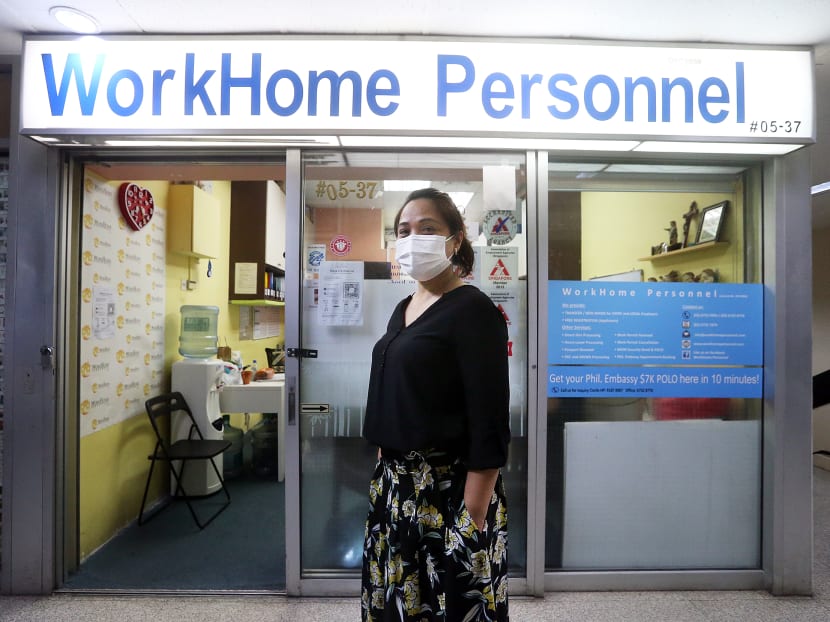
BIGGER ROLE FOR EMPLOYMENT AGENCIES?
Ms Seira Ong, a senior executive from Foreign Domestic Worker Association for Social Support and Training’s (Fast) befrienders and volunteer management arm, said that there must be recourse for domestic helpers to report their grievances and share their side of the story before premature termination.
Fast, a charity supported by MOM, proposes that an employment agency should countersign before its domestic helper is terminated by her employers.
“As a business entity responsible for receiving revenue from the placement of domestic helpers, employment agencies must also be responsible to ensure that the domestic helper is not unreasonably repatriated. More so if the termination is to cover up an abuse,” Ms Ong said.
Ms Jayaprema from AEAS agreed that employment agencies should be involved in all the decisions that an employer makes.
“Being part of the renewal process, the employment agency will also be able to make sure that her renewal terms have been negotiated fairly, she's happy, comfortable and she does want to renew,” she said.
Ms Jayaprema also questioned why the MOM requires the renewal notice to be signed only by the employer. “They have removed such an important feature of the worker signing the renewal notice,” she said.
TODAY has sent queries to MOM.
According to the ministry’s Foreign Domestic Worker Permit Renewal Form, employers of foreign workers are required to obtain written consent for continued employment, but this consent is not required to be filed as a part of the process. Only the names of the helper and employer, the helper’s FIN, the employers’ NRIC or FIN and the employer’s signature and date are required.
The MOM website states: "If the foreigner objects to a work pass application being submitted on their behalf, they may approach MOM. We will ask the employer for the written consent and may take action if it cannot be produced.”
CDE’s Mr Shamsul said that when it comes to transfers, a more effective long-term policy would be for the consent letter — which needs to be signed by an employer — to be scrapped for domestic helpers who have completed their contracts.
“Domestic helpers should be like any worker — free to explore employment opportunities that may come their way at the end of their contract period,” he said.
He added that domestic helpers, who are victims of abuse and unfair employment practices, should automatically be allowed to seek new employment without having to get consent from their current employers who are being investigated by the authorities.
This is to prevent these domestic helpers from being “punished twice” by the system when their employers forcefully repatriate them during an investigation or when one has been initiated, Mr Shamsul said.
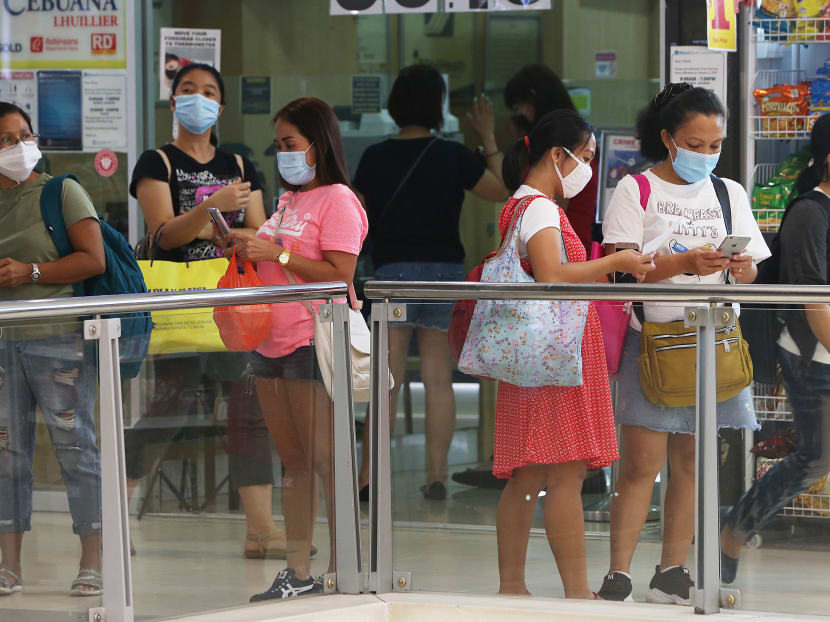
TWC2’s Mr Gee added: “If anyone wants to leave a current employer and go to a new one, it should be made simple and inexpensive. A worker should be able to agree to a new contract before returning home for a break, and then return to begin working with a new employer without paying recruitment fees.”
However, Ms Jayaprema said that relaxing the requirements for a transfer could be a double-edged sword.
“We have to be careful about it because we don’t want to create a situation where the domestic helpers come in and have the mindset of ‘I don’t like it, I will keep moving’,” she said.
Mr Charles Chan, the manager of Able Best Employment Agency, added that if no consent is needed for transfers, a lot of helpers will “start to be choosy” about their employers.
CAN EARLY INTERVENTION HELP?
When it comes to mediating disputes between employers and their domestic workers, employment agencies and NGOs have to tread carefully since there is a risk of escalating an unhappy situation.
“When a helper informs us that her employer is verbally abusive, we reach out to the employer to get the full story. If we feel that no improvement is expected, we suggest to allow the helper to transfer,” said Mr Bensadon of We Are Caring.
“It does not always work. Sometimes the employer will send their domestic worker back home,” he added.
Home’s Ms Jaya added that intervention, in the form of mediation, is helpful and could work in some situations. However, intervening in situations of verbal abuse, for example, is tricky because it could also cause employers to become even angrier at the worker, putting the latter at greater risk of abuse.
Over at the Philippine Embassy, domestic helpers are provided with assistance at the embassy's Migrant Workers Resource Centre.
“We coordinate closely with the police for the early resolution of their complaints. There are also instances where we request the police to issue a no-objection letter for these workers to find new employment opportunities during the pendency of their cases. We monitor their cases closely until these are resolved,” said consul general Candolada.
WHAT MAKES SOME EMPLOYERS ABUSIVE
Employers who abuse their domestic helpers are often driven by the “fundamental human need for power”, psychologists and psychiatrists told TODAY.
“Power gives us the ability to control our environment and self. The more we feel disempowered, the more we want to exert control and power. This can lead to a subconscious misuse of our power and dominance over domestic helpers,” said Dr Joel Yang, a clinical psychologist at Mind What Matters.
Mr Praveen Nair, a psychologist at Raven Counselling and Consultancy, said that the abuser could be someone who is insecure and may also suffer from low self-esteem.
Or, he or she has anger management issues, and may have some maladaptive personality traits such as narcissism or self-entitlement, anti-social or violent traits, said Dr Adrian Wang, a psychiatrist from Gleneagles Medical Centre.
Those who rate higher in narcissism have also been known to rank lower in empathy, noted Mr Nair.
Domestic helpers are an easy target for these individuals to restore their sense of power because of the “stereotypical mindset that they are a class below us”, based on nationality, difference in income and other factors, said Dr Yang.
Dr Wang said that there may be a build-up of other factors, such as anxiety and stress, depression, tiredness, work or family problems, that lower the person's threshold of anger before his or her abusive behaviour is triggered.
“While they (abusers) may not be able to take out their frustrations on the original source such as their own bosses or family members, they end up taking out their frustrations on a convenient and surrogate source — their domestic helper,” said Mr Nair.
Dr Yang suggested that employers should take the time to get to know their helpers to prevent such untoward scenarios. They should also avoid taking out their stress on their helpers.
“Rather than focus on what she doesn’t do well, fixate on all the things she does well and sometimes that can extend to the intangibles as well. For example, her bubbly personality that brings a laugh to your kids,” he said.

As for domestic workers, Ms Rohimah said: “For those who are really scared, I hope they will put a limit to how much they can stand. They should at least tell their friends or family members so if anything unbearable happens, there is someone able to stand as a witness.”
For others who might be in more isolated situations, she urged them to seek attention when an incident happens.
“Scream as much as you can or just shout for help. Try to get out of the house and seek attention from the public and ask the taxi driver to send you to the embassy,” she said.
Indeed, in the case of one Myanmar helper, her plight would remain undiscovered had it not been for her neighbour’s Filipina domestic helper who wanted to be known only as Bing, 37.
While she is not being physically abused, her employers and their two children aged between five and nine, “always call her stupid”, Bing said. She is also only allowed to eat instant noodles and has been forbidden from even eating the bread bought at home.
Bing is watching out for her and also helps her to buy food. She added that she has advised the Myanmar maid to speak to her employer and call MOM but she has refused out of fear.
“Every time I see her she is losing weight. The only time I can see her is when both our kids are playing in front of the house then only she can come out. Or sometimes I meet her in the basement where we throw rubbish,” Bing said.
“When she sees me she will always cry and hug me because she said I am the only person she can trust. She tells me she feels better if she can open up and I am the only person she has. She told me, 'If I don’t have you, maybe I die already.'”











